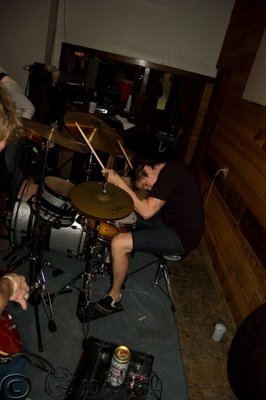Thanks in large part to turntable culture and entrepenuering young record labels (mostly run by DJs themselves) classic soul, deep funk and regional R&B have seen a rebirth as of late. Peanut Butter Wolf’s Stones Throw imprint Now-Again Records may be the most notable, reissuing and beautifully packaging funk and soul gems from groups like Kashmere Stage Band, Detroit Sex Machines and L.A. Carnival. U.K.-based Soul Jazz has down the same with region-centric releases like Miami Sound, Philadelphia Roots and New Orleans Funk.
Similarly capitalizing on import status, Australia’s AIM recently released a trio of records from little-heard funk and soul pioneers. Picking up where the must-own Night Train To Nashville (Lost Highway, 2004) left off, Moody Scott’s Bustin’ Out the Ghetto, Lattimore Brown’s Little Box of Tricks and Bobby Powell’s Louisiana Soul document the bluesy Nashville R&B sound and its gospel-infused New Orleans soul cousin.
As all great reissue discs should, the three records reviewed here come with adequate liner notes, covering the artists’ work from start to finish in concise manner and name-dropping when necessary to create a decent frame of reference. More would be nice but for a tiny import label, what we get seems fine.
Moody Scott
Bustin Out The Ghetto
AIM
2006
Despite roots in New Orleans, Moody Scott found most of his success recording for Nashville-based Sound Stage Seven, run by renowned coast-to-coast disc jockey “John R” Richbourg. Here Scott helped define the Nashville R&B sound. “Bustin Out the Ghetto,” the title track from this collection of all Scott’s Sound Stage Seven recordings, is considered by some to be a “proto-funk” classic. With its shuffling beat, anti-drug message and boisterous horns, “Bustin Out” recalls the great Curtis Mayfield as Scott calls on his people to “stop the Pusherman.”
Contributions from the legendary Muscle Shoals Horns, who recorded with Elton John amongst others whilst building a career as studio musicians, help to define Scott’s sound. More often than not the blaring horns outdo Scott’s hectic vocalizations, both giving the tunes a vibrant, lively vibe, perfect for your next party.
Scott’s roots, and most of his early success, were in Gospel music and his organ playing reflects this. Vocally, Scott mixes things up. From one track to the next, the organist varies from compassionate crooning on “May I Turn You On” to the “dig on this” call and response of the player-hating “I Don’t Dig No Phoney.” A lot of funk and soul pioneers show up in Scott’s music: Sly Stone (“We’ve Gotta Save It”), Bill Withers (“Groovin Out on Line”), and with orgasmic “ughs” and “yeah, yeahs,” James Brown (“I Don’t Dig No Phoney”).
Lattimore Brown
Little Box of Tricks
AIM
2006
Unlike Scott, Lattimore Brown was a Tennessee native, born and bred on Beale Street in Memphis. Brown was not a gospel singer by trade but a blues man, a point reflected in his instrument of choice, the guitar. An early partnership with Nashville-based Excello Records (who also recorded Scott) led to modest success and a roadlife with the chitlin circuit. Little Box of Tricks collects Brown’s recorded works for Sound Stage Seven.
Again, familiar names pop up, in support of Brown. “Don’t Trust No One” and ‘I’m Not Through Loving You” were recorded at Stax studio and feature Booker T & the MGs, unmistakably so. “Cruise on Fanny, Cruise On” plays off the popular “Mustang Sally.” Brown’s sound contains strong elements of “Sally” singer Wilson Pickett, Otis Redding and even some Solomon Burke.
“I’m Not Through Lovin” is a superb, plodding blues number; likewise with “It’s a Sad, Sad World.” “So Says My Heart” has the sort of funky drummer breaks that make DJ’s mouths water. While Little Box of Tricks wins in the novelty category, its dissimilarity from more well-known blues artist renders it dismissible.
Bobby Powell
Louisiana Soul
AIM
2006
Bobby Powell, like Scott and many others, cut his teeth in the world of Gospel music, drawing influence from Ray Charles (like Powell, a blind piano player). Louisiana Soul collects Powell’s recordings for Hep Me Records, recorded between the years of 1979 and 1985.
And with an opening track titled “Queen Size Woman” how can you not fall in love with Powell! Like most of Louisiana Soul, “Queen Size Woman” is a gospelized southern soul ballad of earth-shattering proportions. “I got room in my king size bed for all you queen size women,” Powell croons over searing keys and sexually charged rhythms. Like Dr. John or Allen Toussaint, Powell’s music is full of Crescent City grooves and laid-back night moves.
Complete with handclaps and silky keyboards, “Let Me Love You” is a fantastic R&B number, with Powell’s voice literally soaring above his band, exhibiting an immense vocal talent. “Spread You Love,” “A Fool For You,” and “Drifting Blues” are all great numbers, with Powell raising his passionate and sensual voice to higher and higher heights.
Moody Scott still records and disc jockeys, living in Las Vegas he runs Creole Home Records and still performs, opening for Buckwheat Zydeco and the Nevilles from time to time. Lattimore Brown disappeared from music in the ‘80s and is rumored to have passed away. Bobby Powell has revived Hep Me Records and continues to be active performing Gospel music. All three deserve a close listen, for their contribution to Nashville, New Orleans, funk, soul, R&B and blues music.
Crippled By Society - "Total Rebellion" demo
9 years ago
